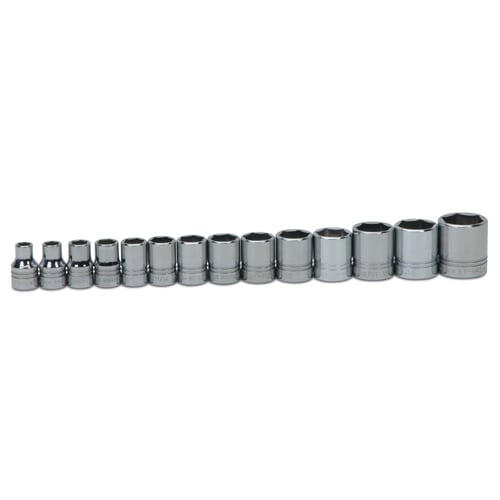Hand Tools

Exploring Socket Materials
When it comes to sockets, choosing the right material is crucial for ensuring durability, performance, and longevity. Socket materials vary in composition, strength, and resistance to wear and tear. Depending on your project requirements, selecting the ideal socket material can significantly impact the success and efficiency of your tasks. In this blog, we will explore different socket materials commonly available and discuss their characteristics, advantages, and ideal applications to help you make an informed choice for your project.
Chrome Vanadium (Cr-V) Steel:
Chrome vanadium steel, also known as Cr-V steel, is a popular socket choice due to its strength and durability. Here are its key characteristics:
-
Strength and Hardness:
Cr-V steel offers high tensile strength and hardness, making it resistant to wear, bending, and breaking during heavy-duty applications.
-
Corrosion Resistance:
Chromium in the alloy provides corrosion resistance, protecting the sockets from rust and extending their lifespan.
-
Versatility: Cr-V steel sockets suit various projects, including automotive repairs, machinery assembly, and general construction tasks.
Chrome Molybdenum (Chrome-Moly) Steel:
Chrome molybdenum steel, also known as chrome-moly steel, is a robust material with enhanced strength and toughness. Here are its key characteristics:
-
High Strength-to-Weight Ratio:
Chrome-moly steel provides exceptional strength while maintaining a relatively lightweight profile, making it suitable for applications requiring strength and maneuverability.
-
Impact Resistance:
The combination of chromium and molybdenum in the alloy enhances impact resistance, making chrome-moly steel sockets ideal for heavy-duty tasks and impact wrench usage.
-
Heat Resistance:
Chrome-moly steel exhibits excellent heat resistance, making it suitable for applications that involve high temperatures, such as automotive engine repairs or metalworking.
Stainless Steel:
Stainless steel is known for its corrosion resistance and aesthetic appeal. While less common for sockets, it has specific advantages in certain scenarios:
-
Corrosion Resistance:
Stainless steel is highly resistant to corrosion, making it suitable for projects that involve exposure to moisture, chemicals, or corrosive environments.
-
Hygiene and Cleanliness:
Stainless steel has non-porous properties, making it easy to clean and maintain. It is often used in food processing and healthcare industries where cleanliness is crucial.
-
Specialty Applications:
Stainless steel sockets are commonly used in industries requiring stringent hygiene standards.
Impact-Grade Sockets:
Impact-grade sockets are designed to withstand the high torque and repetitive impacts of impact wrenches. These sockets are typically made from high-strength alloys, such as chrome-moly steel or specialized tool steel, and undergo additional heat treatment processes for increased durability and impact resistance.
Ideal for Impact Tools:
Impact-grade sockets are specifically designed with impact wrenches and pneumatic tools. They can handle the high torque levels and repetitive impacts these tools produce.
Enhanced Durability:
Impact-grade sockets are engineered to withstand the stress and vibration of impact tools, ensuring longevity and minimizing the risk of socket failure or damage.